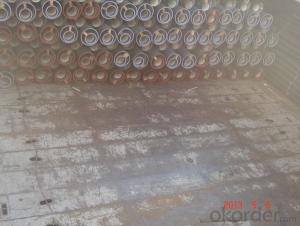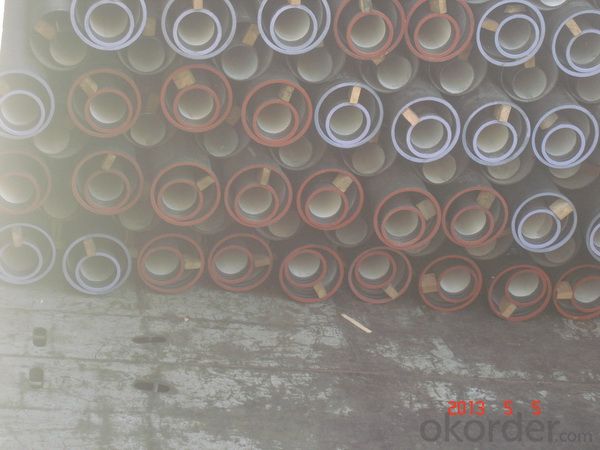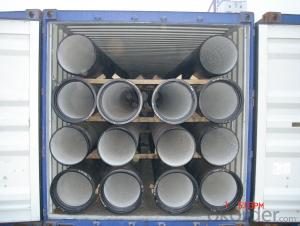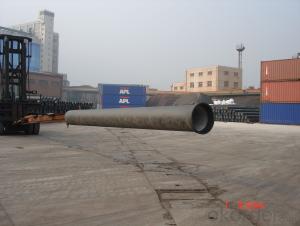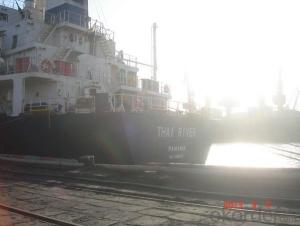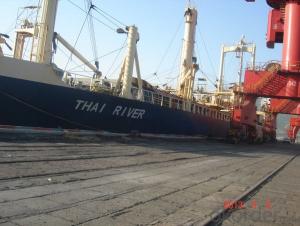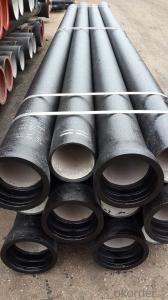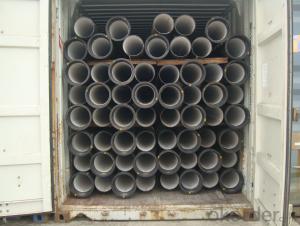DUCTILE IRON PIPES AND PIPE FITTINGS C CLASS DN800
- Loading Port:
- Tianjin
- Payment Terms:
- TT OR LC
- Min Order Qty:
- 22 pc
- Supply Capability:
- 3000 pc/month
OKorder Service Pledge
OKorder Financial Service
You Might Also Like
Material : Ductile Cast Iron
Size Range : DN 80mm to DN 2000mm
Unit Effective Length : 6m or 5.7m
Manufacture Standard: ISO 2531:1998/ EN 545:2006/EN 598:2007
Annual capacity : 200,000 tons
Coating Exterior: Zinc 130g/m2 according to ISO 8179-1 and bitumen coating 70 microns.
Cement Interior: Portland Cement/ High Alumina Cement/ Sulphate Resisting Cement Lining according to ISO 4179
Special requirements on external coating and internal lining can be applied
We also provide accessories such as SBR/EPDM rubber gaskets, lubricant paste, pipe caps, PE sleeves, etc.
Additional Parts:
Each pipe is strictly inspected according to related standard to ensure permanently high performance.
Easy Installation at site and service free for life
Long Service Lifespan
Quotation will arrive you within 24hours once we get your inquiry.
We guarantee offering you a competitive price.
A copy of original inspection reports of pipes will be offered after shipment.
Photos of loading process will be sent to the customer after shipment effect.
We will follow-up the delivery progress after shipment effect and update to the customer on weekly basis.
- Q: How to choose a ductile cast iron pipe with guaranteed quality
- Cutting testing: iron filing resistance, filing issued a "Shua" sound, little sticky file, debris was gray with a small amount of white spot, look at the particles of different size, with small particles of fine powder, finger milling, it is easy to make fingers black. Ductile iron filing: when the resistance ratio of gray iron is slightly larger, there are obvious "Shua" sound ", little sticky file, debris was gray with fine bright particles ranging in size but with large particles, with finger milling chips, can be dyed black to gray fingers, but more black the degree of light
- Q: Are ductile iron pipes resistant to impact damage?
- Ductile iron pipes possess remarkable strength and durability, rendering them resistant to impact damage. Their exceptional toughness and flexibility are a result of their unique composition, which includes a higher percentage of carbon and silicon. Consequently, ductile iron pipes can withstand external forces and impacts, such as those caused by heavy construction equipment or accidental incidents during installation or maintenance activities. Moreover, these pipes exhibit a high resistance to cracking and fracturing, thereby further enhancing their ability to endure impact damage. However, it should be noted that although ductile iron pipes are highly resistant to impact damage, they are not completely immune. Extreme or repeated impacts may still inflict damage, albeit to a lesser extent compared to other pipe types. Regular inspections and maintenance are crucial to detecting and addressing any potential impact damage to ensure the long-term integrity and performance of ductile iron pipes.
- Q: What's the difference between cast iron pipe and steel pipe?
- Steel tube (Steel pipe) production technology development began in the bicycle manufacturing industry, the rise of the early nineteenth Century during the oil development, the two world war ships, boilers, aircraft manufacturing, manufacturing of power boiler after the Second World War, the development of chemical industry of petroleum and natural gas drilling and transportation, will effectively promote the the yield and quality of varieties, the development of steel tube industry.
- Q: How do ductile iron pipes handle extreme temperatures?
- Ductile iron pipes, known also as cast iron pipes, possess the ability to effectively handle extreme temperatures. The material composition of ductile iron enables it to endure both high and low temperatures without experiencing significant damage or degradation. When exposed to high temperatures, ductile iron pipes demonstrate exceptional thermal resistance, rendering them suitable for applications involving the transportation of hot liquids or gases. The high melting point of ductile iron, ranging from 2060°C to 2200°C, guarantees that the pipes can withstand extreme heat without melting or distorting. Consequently, these pipes are ideal for utilization in industries such as oil and gas, steam distribution, and high-temperature water supply systems. Likewise, ductile iron pipes exhibit satisfactory performance in low-temperature environments. They possess a low coefficient of thermal expansion, thereby enabling them to endure the expansion and contraction that occurs during temperature fluctuations without cracking or fracturing. This quality makes them appropriate for use in cold climates or in applications involving the transportation of chilled liquids or gases. Furthermore, ductile iron pipes possess excellent thermal conductivity, allowing them to efficiently dissipate heat. This characteristic proves particularly significant in high-temperature applications where effective heat transfer is vital to prevent damage to the pipes or the materials being transported. In conclusion, ductile iron pipes effectively handle extreme temperatures due to their high melting point, low coefficient of thermal expansion, and exceptional thermal conductivity. These attributes establish them as a dependable choice for various applications involving extreme temperature conditions.
- Q: Are ductile iron pipes suitable for pressure sewer systems?
- Yes, ductile iron pipes are suitable for pressure sewer systems. Ductile iron pipes have excellent strength and durability, making them capable of withstanding high pressure and stress levels. Additionally, they have a smooth interior surface that promotes efficient flow and reduces the risk of clogs. These qualities make ductile iron pipes a reliable choice for pressure sewer systems.
- Q: How are ductile iron pipes different from other types of pipes?
- Ductile iron pipes are different from other types of pipes primarily due to their enhanced strength and durability. Unlike traditional cast iron pipes, ductile iron pipes have a higher tensile strength and can withstand higher internal and external pressures. They are also less prone to cracking or breaking under heavy loads or impact, making them suitable for both above-ground and underground applications. Additionally, ductile iron pipes offer superior resistance to corrosion, which increases their lifespan and reduces maintenance requirements compared to other pipe materials.
- Q: Are ductile iron pipes suitable for use in residential plumbing?
- Ductile iron pipes are indeed a suitable choice for residential plumbing. This material, known for its strength and durability, is resistant to corrosion, making it highly advantageous for plumbing systems. With its remarkable tensile strength, ductile iron pipes can endure high pressure and are less prone to cracking or breaking, unlike other materials. Moreover, these pipes are renowned for their extensive lifespan, lasting over 100 years, guaranteeing reliability in residential plumbing systems. Furthermore, ductile iron pipes exhibit exceptional flow characteristics, ensuring efficient water distribution throughout the entire household. In conclusion, the strength, durability, and corrosion resistance of ductile iron pipes render them a fitting and long-lasting solution for residential plumbing needs.
- Q: Can ductile iron pipes be used for underground chemical transport systems?
- Ductile iron pipes are commonly used for various applications due to their strength, durability, and resistance to corrosion. However, when it comes to underground chemical transport systems, there are certain factors that need to be considered before choosing ductile iron pipes as the suitable material. Firstly, the type of chemicals being transported should be evaluated. Ductile iron pipes are generally resistant to a wide range of chemicals, including acids, alkalis, and organic solvents. However, there are some chemicals that can corrode or react with the iron content of the pipes, leading to degradation and potential leakage. Therefore, it is crucial to assess the chemical compatibility and consult with chemical engineers or experts to determine whether ductile iron pipes are suitable for specific chemical transport applications. Secondly, the concentration and temperature of the chemicals should be taken into account. Elevated temperatures and high concentrations of certain chemicals can accelerate the corrosion process, potentially compromising the integrity of the pipes. It is essential to assess the operating conditions and ensure that the ductile iron pipes can withstand the chemical concentration and temperature levels. Additionally, the potential presence of abrasive or erosive chemicals should be considered. If the transported chemicals contain abrasive particles or have erosive properties, it may lead to increased wear and tear on the inner surface of the pipes, reducing their lifespan and potentially causing leaks. In such cases, alternative materials with higher resistance to abrasion or erosion may be more suitable. Lastly, it is important to comply with relevant regulations and standards. Different countries or regions may have specific requirements for underground chemical transport systems, including the choice of materials. It is necessary to ensure that ductile iron pipes meet the necessary standards and are approved for use in such applications. In conclusion, while ductile iron pipes have many desirable properties for various applications, including underground use, their suitability for chemical transport systems depends on several factors. Chemical compatibility, concentration and temperature levels, the presence of abrasive or erosive chemicals, and compliance with regulations should all be carefully evaluated before deciding to use ductile iron pipes for underground chemical transport systems. Consulting with experts in the field is highly recommended to ensure the safety and effectiveness of the chosen piping material.
- Q: How is ductile iron pipe different from other types of pipes?
- Ductile iron pipe is different from other types of pipes primarily due to its superior strength and durability. Unlike traditional cast iron pipes, which are more brittle and prone to cracking, ductile iron pipes are highly resistant to impact and can withstand higher pressure. Additionally, ductile iron pipes have the advantage of being more flexible and easier to install, making them a preferred choice for various applications such as water and sewage systems.
- Q: What is the expected deflection capability of ductile iron pipes?
- The expected deflection capability of ductile iron pipes is typically quite high compared to other pipe materials. Ductile iron pipes have a flexible nature that allows them to withstand external loads and stresses without breaking or cracking. This flexibility enables the pipes to deflect under pressure, absorbing the force and redistributing it evenly along the pipe's length. The specific deflection capability of ductile iron pipes can vary depending on factors such as pipe diameter, wall thickness, and soil conditions. However, in general, ductile iron pipes can typically deflect up to 2% to 5% of their diameter without causing any significant damage or compromising their structural integrity. This deflection capability allows the pipes to adapt to ground movement, thermal expansion, and other external forces, making them highly resilient and reliable for various applications. It is important to note that the deflection capability of ductile iron pipes should be considered in conjunction with other design criteria, such as the depth of the pipe burial, trench width, and backfill material. Following proper installation practices and adhering to industry standards and specifications will ensure that the expected deflection capability of ductile iron pipes is optimized and maintained throughout their service life.
Send your message to us
DUCTILE IRON PIPES AND PIPE FITTINGS C CLASS DN800
- Loading Port:
- Tianjin
- Payment Terms:
- TT OR LC
- Min Order Qty:
- 22 pc
- Supply Capability:
- 3000 pc/month
OKorder Service Pledge
OKorder Financial Service
Similar products
Hot products
Hot Searches
Related keywords
